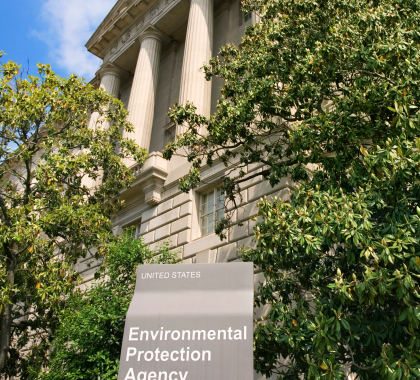In two separate cases, federal courts tossed out lawsuits challenging the Environmental Protection Agency’s (EPA) policy aimed at preventing conflicts of interest for people serving on the agency’s scientific advisory boards.
EPA’s various scientific advisory committees and boards review the quality and relevance of the scientific and technical information the agency uses as the basis for regulations, including reviewing EPA research programs and recommending or issuing research grants.
Preventing Conflicts of Interest
In October 2017, then-EPA Administrator Scott Pruitt issued a directive setting strict new guidelines for those serving on the agency’s advisory panels.
To prevent even the appearance of conflicts of interest, the directive prohibited scientists serving on EPA advisory committees from receiving grants from the agency. Pruitt’s successor, Andrew Wheeler, has continued the policy. As a result, several academics who had been serving on EPA’s advisory panels were removed from them after they refused to relinquish their EPA grants.
In accordance with EPA’s changed policy, Wheeler appointed new members to EPA’s Science Advisory Board and other advisory panels in mid-February of this year. Among those appointed was prominent climate skeptic John Christy, a climate scientist at the University of Alabama at Huntsville. In addition, to provide greater balance on EPA’s panels as required by federal rules, some scientists from regulated industries with specialized expertise replaced scientists from academia on the panels.
Advocacy groups, led by the activist organization Physicians for Social Responsibility, along with some scientists who had previously served on the advisory boards under the old policy allowing advisors on panels that make EPA grants also to be grant recipients, sued to overturn the policy. In Physicians for Social Responsibility Et Al. V. Andrew Wheeler, the plaintiffs argued EPA’s changed policy violated federal ethics guidelines.
Judge Trevor McFadden of the District Court for the District of Columbia rejected that claim, upholding the 2017 policy directive in a February 12 ruling.
‘Substantial Discretion’
EPA has a great deal of discretion under federal rules to determine who and under what conditions a person is qualified to serve on its advisory committees, said McFadden in his decision, and EPA’s policy forcing researchers to choose between serving as an advisor or receiving grants from the agency falls squarely within the agency’s discretion.
“[Laws and regulation at issue] do not dictate whom administrators must, or even should, appoint to federal advisory committees,” McFadden wrote in his ruling. “Agency heads retain substantial discretion to determine membership on federal advisory committees.”
When Pruitt unveiled the new policy, he said it was aimed at assuring the public the agency’s advisory boards were independent.
“We want to ensure that there’s integrity in the process, and that the scientists who are advising us are doing so with not any type of appearance of conflict,” Pruitt said in a press release. “And when you receive that much money, … there’s a question that arises about independence.”
McFadden determined EPA had adequately justified its change in policy based on the agency’s desire to remove any potential for conflicts of interest.
Court Tosses NRDC Lawsuit
In a separate action, the U.S. District Court for the Southern District of New York dismissed a similar lawsuit filed by the Natural Resources Defense Council (NRDC) challenging EPA’s advisory board policy change.
On March 22, the court ruled NRDC lacked standing to sue the agency, having failed to show it or its members were harmed by Pruitt’s directive. NRDC and the Union of Concerned Scientists had both filed lawsuits in early 2018 claiming they and their members would be injured by EPA’s new policy.
In rejecting NRDC’s lawsuit, the court ruled NRDC failed to demonstrate EPA’s changed policies would result in damage to the scientific integrity of its advisory panels. In addition, the court found NRDC had not shown it had been concretely injured by, for example, having some its members removed or barred from federal advisory committees as a result of the directive.
‘Deplorable Behavior and Attitudes’
There is widespread corruption of science throughout federal agencies, says attorney and medical doctor John Dale Dunn, an emergency physician and a policy advisor to The Heartland Institute, which publishes Environment & Climate News.
“I have had repeated interactions with federal advisory scientific panels over the past three decades, in which the participants exhibited deplorable behavior and attitudes on scientific issues,” said Dunn. “They pretended to be open to discussing disputed scientific issues that influence policymaking, but they were biased and closed-minded, regularly using studies based on junk science using flawed methodologies that confused correlation with causation, and accepted claims of harm based on unrealistically high assumptions about exposure levels and the dangers of exposure to miniscule amounts of chemicals.
“There is a very serious problem with the government research complex; it has been corrupted, with the scientific advisory panels not being reliable referees of either the scientific process or the government regulations they recommend or support,” Dunn said. “I am very pleased the courts have recognized the benefits of having scientific advisory panels convened with precautions taken to ensure objective and fair assessments of the scientific issues being considered.”
Considers It Common Sense
EPA’s action to prevent conflicts of interest is long overdue, say David Wojick, Ph.D., a senior policy analyst with the Committee for a Constructive Tomorrow (CFACT).
“It makes sense people getting government money to study a specific issue should not be advising the government on the importance of that issue,” Wojick said. “The conflict of interest in such situations is obvious, and it’s good EPA has finally confronted it.”
Bonner R. Cohen, Ph.D. ([email protected]) is a senior fellow at the National Center for Public Policy Research and a senior policy analyst with CFACT.





